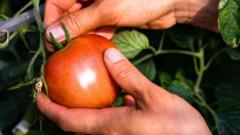BBC Investigation Reveals Potential Forced Labor in Tomato Puree Supply Chains
A BBC investigation has uncovered that several UK supermarkets may be selling tomato purees containing tomatoes grown in China’s Xinjiang region, an area associated with forced labor of Uyghur and other Muslim minorities.
The investigation tested 64 different tomato purees sold in the UK, Germany, and the US, using origin verification techniques to analyze the trace elements unique to tomatoes grown in different countries. The findings suggested that 17 products, mostly own-brand items, likely contained Chinese tomatoes.
Many of the products marketed as “Italian” tomato purees, including those from Tesco, Asda, Morrisons, Waitrose, and several German retailers, appeared to contain tomatoes from Xinjiang. The region is notorious for its mass detention of Uyghurs, with human rights groups alleging widespread forced labor.
The BBC interviewed 14 individuals who reported experiencing or witnessing forced labor in Xinjiang’s tomato fields. Witnesses described harsh working conditions, including beatings and electric shocks for failing to meet high daily quotas.
A key player in the investigation was the Italian company Antonio Petti, which received over 36 million kg of tomato paste from Xinjiang companies between 2020 and 2023. An undercover BBC reporter captured a Petti manager admitting to using Chinese tomatoes if a client was willing.
Most supermarkets denied the findings, conducting their own investigations and disputing the testing methodology. However, Lidl acknowledged using Chinese tomatoes in one product for a short period due to supply issues.
The investigation revealed how Xinjiang tomatoes are transported to Europe through a complex route involving Kazakhstan, Azerbaijan, and Georgia, ultimately arriving in Italy. The Petti group not only produces its own branded products but also supplies tomato goods to supermarkets across Europe.
In 2021, one of Petti’s factories was raided on suspicion of fraud related to passing off foreign tomatoes as Italian. The case was later settled out of court.
The BBC found evidence suggesting that Petti may have continued using Chinese tomatoes through a potentially shell company, Bazhou Red Fruit, despite claims of stopping purchases from sanctioned suppliers.
The investigation highlights the challenges in preventing forced labor in global supply chains. While the US has implemented strict legislation banning Xinjiang exports, Europe and the UK have relied on self-regulation.
Anti-Slavery International warns that upcoming EU legislation might push forced labor products toward markets with weaker regulations, like the UK. A UK government spokesperson stated they are committed to preventing forced labor in supply chains.
Food lawyer Dario Dongo emphasized the broader issue, questioning the true cost of low-priced food and who ultimately pays the price for such products.




